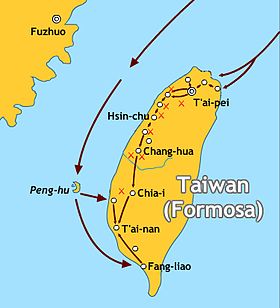1895 Japanese Conquest of Taiwan
| Japanese Invasion of Taiwan (1895) | |||||||||
|---|---|---|---|---|---|---|---|---|---|
 Japanese operations in Taiwan, 1895 |
|||||||||
|
|||||||||
| Belligerents | |||||||||
|
|
|
||||||||
| Commanders and leaders | |||||||||
|
|
|
||||||||
| Strength | |||||||||
| 7,000, rising to 37,000 by October 1895 around a dozen warships |
75,000 (ex-Qing regulars, local volunteers and Hakka militia) | ||||||||
| Casualties and losses | |||||||||
| Killed: 164 Wounded: 515 Died from disease: 4,642 |
Killed: 14,000 including civilian casualties | ||||||||
The Japanese invasion of Taiwan (Chinese and Japanese: 乙未戰爭) (May–October 1895) was a conflict between the Empire of Japan and the armed forces of the short-lived Republic of Formosa following the Qing Dynasty's cession of Taiwan to Japan in April 1895 at the end of the First Sino-Japanese War. The Japanese sought to take control of their new possession, while the Republican forces fought to resist Japanese occupation. The Japanese landed near Keelung on the northern coast of Taiwan on 29 May 1895, and in a five-month campaign swept southwards to Tainan. Although their advance was slowed by guerrilla activity, the Japanese defeated the Formosan forces (a mixture of regular Chinese units and local Hakka militias) whenever they attempted to make a stand. The Japanese victory at Baguashan on 27 August, the largest battle ever fought on Taiwanese soil, doomed the Formosan resistance to an early defeat. The fall of Tainan on 21 October ended organised resistance to Japanese occupation, and inaugurated five decades of Japanese rule in Taiwan.
In 1894 China and Japan went to war. In a few short months the Japanese defeated China's Beiyang fleet, routed the Chinese armies in Manchuria, and captured Port Arthur and Weihaiwei. Although nearly all the fighting took place in northern China, Japan had important territorial ambitions in southern China. As the war approached its end, the Japanese took steps to ensure that Taiwan would be ceded to Japan under the eventual peace treaty and that they were well placed militarily to occupy the island. In March 1895 peace negotiations between Japan and China opened in the Japanese city of Shimonoseki. Although hostilities in northern China were suspended during these negotiations, Taiwan and the Pescadores were specifically excluded from the scope of the armistice. Possession of the Pescadores, lying midway between mainland China and Taiwan, was the key to a successful occupation of Taiwan.
...
Wikipedia
